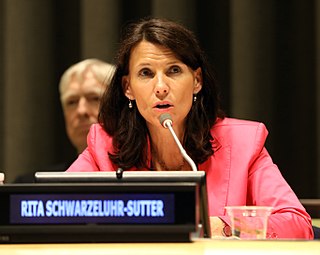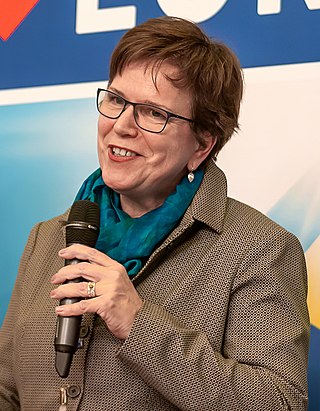Related Research Articles
The Fraunhofer Society is a German research organization with 76 institutes spread throughout Germany, each focusing on different fields of applied science. With some 30,800 employees, mainly scientists and engineers, and with an annual research budget of about €3.0 billion, it is the biggest organization for applied research and development services in Europe. It is named after Joseph von Fraunhofer who, as a scientist, an engineer, and an entrepreneur, is said to have superbly exemplified the goals of the society.
The knowledge economy, or knowledge-based economy, is an economic system in which the production of goods and services is based principally on knowledge-intensive activities that contribute to advancement in technical and scientific innovation. The key element of value is the greater dependence on human capital and intellectual property as the source of innovative ideas, information and practices. Organisations are required to capitalise on this "knowledge" in their production to stimulate and deepen the business development process. There is less reliance on physical input and natural resources. A knowledge-based economy relies on the crucial role of intangible assets within the organisations' settings in facilitating modern economic growth.

IG Metall is the dominant metalworkers' union in Germany, making it the country's largest union as well as Europe's largest industrial union. Analysts of German labor relations consider it a major trend-setter in national bargaining.

The Parliamentary Under-Secretary of State is the lowest of three tiers of government minister in the UK government, immediately junior to a Minister of State, which is itself junior to a Secretary of State.

The Ministries of Japan or Government Agencies of Japan are the most influential part of the executive branch of the Government of Japan. Each ministry is headed by a Minister of State appointed by the Prime Minister. In postwar politics, the posts of ministers have been given to senior legislators, mostly of the LDP. However, few ministers serve for more than one or two years to develop the necessary grasp of the organisation to become really influential. Thus, most of the power lies within the ministries, with the senior bureaucrats.
Trade unions in Germany have a history reaching back to the German revolution in 1848, and still play an important role in the German economy and society.

The Federal Ministry for Economic Affairs and Climate Action, abbreviated BMWK, is a cabinet-level ministry of the Federal Republic of Germany. It was previously known as the "Ministry of Economy". It was recreated in 2005 as "Ministry of Economics and Technology" after it had previously been merged with other ministries to form the Federal Ministry for Economics and Labour between 2002 and 2005. The ministry is advised by the Council of Advisors on Digital Economy.

A technological revolution is a period in which one or more technologies is replaced by another novel technology in a short amount of time. It is a time of accelerated technological progress characterized by innovations whose rapid application and diffusion typically cause an abrupt change in society.
Europe 2020 is a 10-year strategy proposed by the European Commission on 3 March 2010 for advancement of the economy of the European Union. It aims at a "smart, sustainable, inclusive growth" with greater coordination of national and European policy. It follows the Lisbon Strategy for the period 2000–2010.

Occupational safety and health (OSH) or occupational health and safety (OHS) is a multidisciplinary field concerned with the safety, health, and welfare of people at work. OSH is related to the fields of occupational medicine and occupational hygiene and aligns with workplace health promotion initiatives. OSH also protects all the general public who may be affected by the occupational environment.

"Fourth Industrial Revolution", "4IR", or "Industry 4.0" is a buzzword and neologism describing rapid technological advancement in the 21st century. The term was popularised in 2016 by Klaus Schwab, the World Economic Forum founder and executive chairman, who says that the changes show a significant shift in industrial capitalism.

The Mechanical Engineering Industry Association (VDMA) is a German association of 3,600 German and European mechanical and plant engineering companies. 'Industry' refers to innovation, export orientation and SMEs. The companies employ around 3 million people in the European Union (EU), and more than 1.2 million in Germany alone. This makes mechanical and plant engineering the largest employer among the capital goods industries, both in the EU and in Germany. In the EU, it represents a turnover volume of an estimated 860 billion euros. Around 80 percent of the machinery sold in the EU comes from a manufacturing plant in the domestic market.
A ministry of labour (UK), or labor (US), also known as a department of labour, or labor, is a government department responsible for setting labour standards, labour dispute mechanisms, employment, workforce participation, training, and social security. Such a department may have national or regional authority.

Oliver Grün is a German engineer and entrepreneur. He is the founder and CEO of GRÜN Software AG in Aachen, since 2015 President of European Digital SME Alliance and President of the Federal Association of IT-SMEs of Germany (BITMI), the only information technology industry association which exclusively represents the interests of small and medium-sized enterprises (SME) in Germany. Since 2013 he is member of the Council of Advisors on Digital Economy at the Federal Ministry for Economic Affairs and Energy, which gives advice on issues concerning the digital economy.

Rita Schwarzelühr-Sutter is a German politician of the Social Democratic Party (SPD) who serves as a member of the German Bundestag, the German federal parliament.

In Austrian politics, the Federal Ministry for Digital and Economic Affairs is the ministry in charge of promoting commerce and industry, overseeing public works, and maintaining the public infrastructure. In some recent cabinets, it has also been responsible for employment; in others, for family affairs and science.
The Federation of German Industries is the umbrella organization of German industry and industry-related service providers. It represents 39 industry associations and more than 100,000 companies that employ around 8 million workers. Membership is voluntary. A total of 15 Bundesland-level agencies represent the interests of the economy at regional level. The headquarters of the BDI is the Haus der Deutschen Wirtschaft in Berlin. Its president is Siegfried Russwurm. BDI has offices in Germany and abroad.

Gabriele Bischoff is a German politician of the Social Democratic Party (SPD) who is serving as a Member of the European Parliament.
The Thai-German Institute (TGI) is a not-for-profit entity under the Foundation for Industrial Development (FID), which itself falls under the Ministry of Industry (Thailand). The aim of the organization is to act as a training center for transferring advanced manufacturing technology to the Thai industry.

Matthias Herbert Hartmann was a German Professor of Business Administration and the Dean of the Department of Economics and Law at the Hochschule für Technik und Wirtschaft Berlin. As an expert for innovation and technology management, he worked as a business consultant. In his function as staff officer of the reserves, he was a consultant in Germany's Federal Ministry of Defense.
References
- ↑ European Political Strategy Centre (2016). The Future of Work: Skills and Resilience for a World of Change. EPSC Strategic Notes, Issue 13. Retrieved May 3rd, 2018.
- ↑ Vogler-Ludwig, K., Düll, N., Kriechel, B. (2016). Arbeitsmarkt 2030 - Wirtschaft und Arbeitsmarkt im digitalen Zeitalter. Prognose 2016. Munich: Economix Research & Consulting.
- ↑ Federal Ministry of Labour and Social Affairs of Germany (2017). Re-Imagining Work: White Paper Work 4.0, p. 5.
- ↑ Salimi, M. (2015). Work 4.0: An Enormous Potential for Economic Growth in Germany. ADAPT Bulletin.
- ↑ "Suchy, O. (November 17th, 2015). Stellungnahme des DGB zum Grünbuch "Arbeiten 4.0" des Bundesministeriums für Arbeit und Soziales. Retrieved August 18th, 2018" (PDF). Archived from the original (PDF) on 2018-09-20. Retrieved 2018-08-18.
- ↑ "VDMA. Work 4.0 - Humans at its heart". Archived from the original on 2021-01-24. Retrieved 2018-08-18.
- ↑ "BDA (May 2015). Chancen der Digitalisierung nutzen: Positionspapier der BDA zur Digitalisierung von Wirtschaft und Arbeitswelt. Retrieved August 18th, 2018" (PDF). Archived from the original (PDF) on 2018-09-20. Retrieved 2018-08-18.
- ↑ World Bank World Development Report 2019: The Changing Nature of Work.
- ↑ International Labour Organization: The Future of Work Centenary Initiative. Retrieved August 18th, 2018.
- ↑ Federal Ministry of Labour and Social Affairs of Germany (2015). Re-Imagining Work: Green Paper Work 4.0, pp. 33-5.
- ↑ Federal Ministry of Labour and Social Affairs of Germany (2017). Re-Imagining Work: White Paper Work 4.0, pp. 18-41.
- ↑ Federal Ministry of Labour and Social Affairs of Germany (2017). Re-Imagining Work: White Paper Work 4.0, pp. 42-91.
- ↑ Federal Ministry of Labour and Social Affairs of Germany (2017). Re-Imagining Work: White Paper Work 4.0, pp. 98–187.
- ↑ "The Changing Nature of Work" . Retrieved 7 October 2018.
- ↑ "The Fourth Industrial Revolution, by Klaus Schwab". World Economic Forum. Retrieved 2020-07-27.
- ↑ Roose, Kevin (2019-01-25). "The Hidden Automation Agenda of the Davos Elite". The New York Times. ISSN 0362-4331 . Retrieved 2020-07-27.
- ↑ Min, Jeehee; Kim, Yangwoo; Lee, Sujin; Jang, Tae-Won; Kim, Inah; Song, Jaechul (2019-12-01). "The Fourth Industrial Revolution and Its Impact on Occupational Health and Safety, Worker's Compensation and Labor Conditions". Safety and Health at Work. 10 (4): 400–408. doi: 10.1016/j.shaw.2019.09.005 . ISSN 2093-7911. PMC 6933166 . PMID 31890322.